
A Sense of Doubt blog post #3470 - 50 Years of Dungeons and Dragons

New DnD Stamps Celebrate Game’s 50th Anniversary
United States Postal Service to release limited edition stamps featuring classic Dungeons & Dragons art
Over the years the Dungeons & Dragons brand has appeared in countless places, with everything from t-shirts and playing cards to video games and big screen Hollywood films. Now, the legendary RPG is coming to an envelope near you as a series of exclusive DnD stamps from the United States Postal Service (USPS) that are being released to commemorating the 50th anniversary of the legendary TTRPG.
So get ready to roll a saving throw versus shipping and handling, as we take a closer look at these unique collectibles.

What’s included in the new DnD stamps?
The upcoming DnD stamps are part of a series of four new USPS sets (also included is a celebration of UCLA basketball coach John Wooden, carnivals and legendary photographer Ansel Adams). Each set will include 20 individual stamps with 10 unique pieces of art pulled from Wizards of the Coast’s archives.
Notably, all of the images have appeared in previous Wizards of the Coast materials, including a number of DnD game supplements and related Magic the Gathering cards. Probably the most recognizable is the iconic image of a barbarian facing down a red dragon, which was illustrated by the legendary Larry Elmore and featured on the 1983 “red box” version of Dungeons & Dragons. Sharp eyed fans will also likely recognize the cover to the 2014 Dungeon Master’s Guide, and the appearance of the popular drow ranger Drizzt Do’Urden.
All of the images were selected for usage by longtime USPS Art Director Greg Breeding and resized to be able to fit into the limited space available on a single postage stamp. The packaging the stamps will be included in will also likely include a DnD flourish, although the USPS hasn’t released any details on that just yet.

When are the new DnD stamps coming out?
Currently, the USPS has yet to confirm the exact release date and pricing for the new DnD stamps. Given the ongoing celebrations being planned by Wizards of the Coast to celebrate the 50th anniversary of DnD, it’s likely going to occur in early 2024.
It’s worth noting that while these stamps are primarily designed for collectors, they can in fact be used as actual postage. So if you’ve ever wanted to use Tiamat to mail in your furnace bill, now’s definitely your chance.
What else in store for the DnD 50th Anniversary?
2024 is a major milestone for Dungeons & Dragons, with the release of a number of new products to commemorate the 50th anniversary of the game. This includies an updated Core Rulebooks (including a new 2024 Player’s Handbook), a remake of the classic adventure Descent in the Lost Caverns of Tsojcanth, a new high-level campaign entitled Vecna: Eve of Ruin, and an anthology of one-shots entitled Quests from the Infinite Staircase.
Given the major push from Wizards of the Coast to celebrate the 50th anniversary, DnD collectors stamps are likely just the beginning in terms of tie-in merchandise.

More D&D News Coverage
For more from the world of Wizards of the Coast, visit our D&D News page.

Cameron Nichols is a Senior Editor who lives in Boston, Massachusetts, and has been playing D&D since the early 90s, when he was introduced by his older brother and cut his teeth on AD&D 2nd Edition. Since then he’s played virtually every RPG he could get his nerdy little mitts on (including a weird Goth phase in the early 2000s when he rocked Vampire: The Masquerade pretty hard). His favorite D&D campaign setting is the Forgotten Realms and his favorite character to play was a Half-Orc Barbarian named Grug (who was unfortunately devoured by a gelatinous cube).
*We are a member of the DMsGuild affiliate marketing program, which provides us with a small commission on any sales at no additional cost to you the consumer.
Critical Success —
Dungeons & Dragons turns 50 this year, and there’s a lot planned for it
It started with "a new line of miniatures rules" and became a global phenomenon.
With this letter, written by Gary Gygax to wargaming zine publisher Jim Lurvey, one of the founders of what would become TSR, announced that a January 1974 release for Dungeons & Dragons was forthcoming. This, plus other evidence compiled by Jon Peterson (as pointed out by the Grognardia blog), points to the last Sunday of January 1974 as the best date for the "anniversary" of D&D. The first sale was in "late January 1974," Gygax later wrote, and on the last Sunday of January 1974, Gygax invited potential customers to drop by his house in the afternoon to try it out.
You could argue whether a final draft, printing, announcement, sale, or first session counts as the true "birth" of D&D, but we have to go with something, and Peterson's reasoning seems fairly sound. Gygax's memory, and a documented session at his own house, are a good point to pin down the celebration of this thing that has shaped a seemingly infinite number of other things.
Also, at some point this year, stamps celebrating D&D's 50th will be available from the US Postal Service, at least if you rush. Ten different designs, leaning heavily on the dragons, were commissioned based on existing illustrations. There's a documentary from Joe Manganiello (still in pre-production, seemingly). And there's a 500-plus-page non-fiction book, The Making of Original Dungeons & Dragons: 1970-1976, with research help from the aforementioned Peterson, containing never-before-seen correspondence between co-creators Gygax and Dave Arneson.
I grew up in the 1980s and 1990s, never actually playing Dungeons & Dragons, but its influence shaped vast amounts of my playtime and curiosity. I loved playing Hero Quest, without knowing that it was essentially an on-rails D&D setup. My cousin and I spent large parts of one summer attempting to play Marvel Super Heroes without understanding its D&D roots (or that it would always be a bit awkward with just two people).
And, of course, every video game, comic, novel, and other media I consumed that made a point of explaining how different classes worked, or the theory behind spells, owed something to D&D—by way of J.R.R. Tolkien and centuries of folklore tradition, of course. Tales keep inspiring other tales, and it's largely to our benefit.
Take a moment on this occasion to look back through some notable D&D coverage at Ars:
- A preview of D&D "Next" in 2012, when the system started streamlining on its way toward 5th Edition
- A full review of 5th Edition in 2016, after a year that saw staggering sales based on warm reception
- D&D's entry into the Toy Hall of Fame at the Strong National Museum of Play, alongside such icons as the Frisbee, the Barbie doll, and the Atari 2600
- Annalee Newitz's review of Rise of the Dungeon Master, a graphic novel about Gygax's powerful creativity but also notable flaws
- Last year's controversy over Wizards of the Coast's attempt to rework its Open Gaming License, the exodus it fomented, and its eventual rollback.
For
Dungeons & Dragons, the magic is in the memories
In honor of the game’s 50th anniversary, five players share how
the game shaped them.
50 YEARS OF D&D
We’d been playing Dungeons & Dragons together for five years, starting because we wanted to keep in touch after graduating high school. None of us had played much before, but it didn’t matter. We learned together, navigating the rules and making each other laugh (and sometimes cry) with the story we created.
Dungeons & Dragons turns 50 this year. Over the decades since the game was created and designed by Gary Gygax and Dave Arneson, it has been transformed in the public consciousness from an image of social misfits playing in basements to a commercial behemoth. But the emotional bonds forged along the way are what players remember. We asked five of them to share a moment that stuck with them.
— Lillian Barkley, Opinions audience strategy editor
1970s: A miracle from my brother
Anderson Cooper is a journalist and anchors “Anderson Cooper 360” on CNN.
I was around 11, and my older brother and I had started playing a new game. We had previously played with toy soldiers, staging elaborate troop movements through our house by following the rules from H.G. Wells’s “Little Wars,” so we had a history of having a joint fantasy in our head. This new game, Dungeons & Dragons, was a natural extension of that.
There were polyhedral dice, which were interesting, but it wasn’t a board game. It was a storytelling game. It was both happening in our imaginations and playing out in real life with our friends around a table. We were all in this fantasy together, a group delusion in which everybody bought into the reality. And it was extremely important to me.
My brother, Carter, two years older than I was, came to it first after our father died in 1978. It allowed us to lose ourselves together and gave us a brief respite from the sadness that had descended on us. When we were playing D&D, we weren’t stuck in the silences of not talking about him. We could talk about D&D.
I see us now hunched in a circle, waiting for this incredible adventure to begin. My brother set it up, hiding his papers behind a screen to keep the elaborate plans he’d made for us secret, and there was a palpable excitement as we wondered what magical world he had created.
This game gave me license to extend my childhood just a bit longer and permission to feel joy and excitement again. I was a sad boy, stunned and terrified by my dad’s sudden death, but playing D&D, I could dive into the table and emerge on the other side as a swashbuckling elven thief, slaying orcs and other monsters. But death found me even in D&D. The game may not have winners and losers like other games, but it does have loss. I dont recall exactly what happened, but in some underground lair, my character, Fletcher, was killed. I was stunned and inconsolable. I refused to accept the death of this imaginary alter-ego for whom I deeply cared. Thankfully, the game allows for miracles the real world does not. My brother, using the mechanics afforded to him in his omniscient role, prolonged Fletcher’s story by magically reviving him.
We stopped playing a few months later. My brother, Carter, was developing other interests and D&D no longer seemed so cool. He died by suicide when he was 23. In going through his things recently, I found his “Dungeon Masters Guide” and “Monster Manual,” along with a binder full of hand-written notes he’d made for our games and detailed maps of mazes he’d created for our characters to explore. I’m not sure what to do with them, but I can’t throw them away because they are such a part of who he was when we were kids.
The care and imagination my brother put into our adventures inspired in me a love of exploring and storytelling. I left high school early and rode in a truck across sub-Saharan Africa for several months, from Johannesburg to Bangui in the Central African Republic. It was the beginning of a lifetime of travel and adventure and learning to tell stories of my own.
1980s: A mythology of the mind
Lev Grossman is the author of “The Bright Sword” and the “Magicians” trilogy.
We started hearing rumors about it when I was in fourth grade. Nobody knew exactly what Dungeons & Dragons was except that it wasn’t quite a normal game; it was something weird and arcane and important, like sex or calculus. An older boy who’d played it showed me, furtively, a map hand-drawn in ballpoint pen on graph paper. I struggled to grasp the concept. Was it a board game? Like Sorry? But the pieces could go, like, in any direction? And there’s more than one board? “In D&D,” the boy said sagely, “there are many maps.”
Then one day my friend Ben called and said his brother had a copy of the game. Did I want to play? I did. I hung up the phone — it was a rotary phone, the kind that’s firmly attached to a wall — and solemnly announced to my family: “This is the greatest day of my life.”
It wasn’t, but it was a very good day. We probably played the Village of Hommlet, which came standard with the Basic Set. Ben’s older brother was the dungeon master. I played a magic user, so I didn’t wear armor, and my only weapon was a dart. I cast my one first-level spell — magic missile, obviously — and then I died. I loved it.
I was raised with no particular religion, and the suburb of Boston where I grew up was an arid, unspiritual place. D&D supplied me with something I was desperately missing: a mythology. I was overflowing with surging pre-pubescent feelings that were beyond my ability to manage or understand, but D&D activated in me vast, hitherto dormant realms. I was learning how to navigate the dungeons of my own subconscious, with their many maps, where the dragons lived, and how to survive there.
As much as I loved it, when it came to the actual playing of D&D, I was awful — both at playing it and to play it with. On some level I still didn’t get the concept of D&D because all I wanted to do was win it. If I’m being charitable, I might say that I cared too much. I would do anything to keep my character from dying: lie about my dice rolls, conveniently forget rules, invent other rules and argue legalistically with the DM about them. My more imaginative friends would role-play as their characters, act out the scenes and do the voices. I just tried to get all the treasure I could.
As I got older, my tastes evolved. Reading the rulebooks gradually replaced the pleasure of actually playing D&D. I drew vast unplayable maps and combed through the books for bizarre minutiae — the “Players Handbook” contained a reference to a weapon called the Bohemian ear spoon, and I spent hours speculating about the nature of this cruelest of pole-arms. I sought out the more obscure and bizarre modules, like the infamously unbeatable “Queen of the Demonweb Pits.” Much of my adult sexuality is probably rooted in my contemplation of the alluring drawing of Tlazolteotl, Aztec goddess of vice, in the “Deities and Demigods” handbook.
It didn’t last forever. Eventually, my attention wandered — like Jackie Paper, I got interested in other toys. D&D offered many pleasures but not the pleasure of feeling cooler and cleverer than other people, and I, a callow teenager, went off in search of games that were easier to win.
But the dragons would have the last laugh. Years later, when I grew up and became a writer, I initially chose the path of conventional literary fiction — I wanted to write books that were respectable, full of my caustic, clear-eyed observations about good old-fashioned social reality. But I didn’t have much success at it, and it was a long time before I realized I wasn’t a literary writer at all. It wasn’t until I changed horses and wrote a novel about people who cast spells and explored a magic land that I found my voice and had my first success.
I didn’t belong in the surface world, with the cool and clever people. My place was down in the dungeons, where the dragons lived. That’s where the treasure was all along.
1990s: A good dungeon master is a good collaborator
Joseph Gordon-Levitt is an actor, writer, director and the founder of HitRecord.
It was something like 1994. I was 13. My friend Nick was coming over later, and I was getting ready. We had agreed that I would be dungeon master that day. I was behaving a bit like a screenwriter outlining a movie and a bit like a kindergartner playing pretend. I paced around my room, absorbed in thought, a pad of graph paper and pencils ready at hand somewhere on the carpeted floor. And then, I had an idea.
I imagined a flood, not a real flood, a magic one, an unrealistically massive amount of water. The currents far too powerful to swim, the threat mortal; our main character would need to escape — somehow. But how? He would have to use his shield! He’d ride the deluge like a medieval boogie-boarder all the way to safety. I’m not saying it was a brilliant idea, but I was totally sold at the time. Our adventure’s climax firmly in mind, I felt ready to play.
Not long after Nick’s mom dropped him off, we sat down on the carpet and got to it. How does the game begin? Do you turn something on? Do you deal cards? Do you start at Go? No, none of the above. As the DM, I just started talking to Nick in the second person, describing his character’s experience. “Okay so, you’re at a tavern,” I might’ve begun. That’s where a lot of adventures started, us young adolescent dudes fantasizing about what it might be like to go to a bar.
At the tavern, Nick’s character met a mysterious thief who knew of a hidden dungeon containing unknown treasures and needing a partner with whom to make the dangerous but potentially lucrative journey. On their way, they probably met a few orcs or wraiths they had to fight, Nick and me rolling dice, doing arithmetic, erasing and re-penciling numbers on graph paper to determine the outcome of the combat. Once in the dungeon, I used a new sheet of paper to map the labyrinthine passageways and specify the locations of other monsters that needed fighting. The whole while, of course, I was thinking about my predetermined climax.
Nick’s character did have a shield because I had surreptitiously persuaded him to spend some of his gold on one before the adventure began. Everything was going according to plan. Then, once the time was right, I brought in the flood. “You hear something,” I told him. “A rumbling. It’s getting closer. And louder.”
“What is it?” he asked.
“You can’t tell, but it’s getting really loud now. Do you want to run?” I prompted him.
“No, I want to see what it is,” he said.
BADOOSH! The magic water exploded into the dungeon’s chamber, the door flying off its hinges. The Chaotic Evil Mage from whom our heroes had stolen was exacting his revenge. Nick’s character ran. Now he just needed to flip over his shield and ride the rushing water.
But he didn’t.
Uh-oh. I tried to coax him into it.
“The water’s gonna pull you under; you gotta do something.”
“I swim hard!” he said, not knowing what else to do.
But that wasn’t what I was looking for. The idea I’d started with was not coming to pass. The climax of our story would have to become something else. And that, dear reader, is what makes Dungeons & Dragons unique. A good DM can imagine literally anything and make that part of the adventure, but once the game begins, they also have to be flexible, ready to come up with new ideas in response to the equally limitless imaginations of their players.
This is the crux of collaboration.
I wish I could remember exactly how my adventure with Nick ended that day. I do know it didn’t end as I expected. And as I’ve grown from a 13-year-old D&D player into an adult in the working world, that spirit of collaboration has only revealed itself to be more and more valuable. These days, I put much less weight on my own ideas and much more on what becomes of them once other people join in the game.
2000s: A community of my own
Matthew Mercer is a voice actor and co-founder of Critical Role, where he serves as chief creative officer and game master for the company’s flagship show, “Critical Role.”
One by one, they stopped coming to play. Folks who had never tried it canceled at the last minute, feeling awkward about joining something they didn’t understand. Experienced players who were looking forward to making characters and building a story together struggled to explain to their partners why they needed to spend hours away with their “work friends” to play make-believe. The D&D campaign I had poured myself into fizzled to nothing. I wasn’t angry at my friends, but I was worried about the death of this passion that had meant so much to me.
I was a kid whose heart sat in high fantasy, so D&D was very much an experience I felt drawn to. I spent countless afternoons after high school in the ’90s at the Collectors Asylum in Westlake Village, Calif., the local comic shop that also sold tabletop role-playing books and “Magic” cards. The Satanic Panic of the ’70s and ’80s still lingered like an albatross, while TV shows and films endlessly made us the butt of nerd jokes, playing up stereotypes of ultimate geekdom. The zeitgeist perpetuated the idea that “to play D&D was to be an outcast.”
The stores were my first taste of this colorful and creative world of gamers. The back corners were consumed with groups gathered around card tables, inventing their own stories together. These were the places I used to go on my lunch break, my little escapes when I had a moment, even if I didn’t buy anything. These were our social spaces. It felt like I walked into a community of my own.
In the 2000s, however, video games like “World of Warcraft” became cultural juggernauts, and “pen and paper” games started to fade. Many of the game stores I frequented shut their doors. It had all these signs of an extinction. I felt like this joyful pastime of mine was dying on the vine.
So after each group fell apart, I just tried to find fresh folks who might want to engage in that new journey. It largely ended up being friends who trusted me, were newer to the game and were curious to try it out. Preaching of the joys of rolling dice and playing make believe, I hoped that things could turn around.
We started video streaming our private game in 2015 and it became the web series “Critical Role,” which has inspired fans around the world to start their own games. I am so thankful I didn’t give up.
2010s: A character’s journey — and my own
Ally Beardsley is a comedian and actor in the Dropout series “Dimension 20.”
I was an aspiring comedian in Los Angeles and had just landed a salaried job at the comedy website CollegeHumor. My co-worker and friend Brennan Lee Mulligan was looking for six comedians to create a show that would be like an at-home game of D&D. Why not? “Dimension 20” became a weird punctuation to my day.
I remember there being too many rules to remember. I kept turning to my friend, Brian Murphy, to ask which dice I should be rolling. I wasn’t paid overtime, but I loved the group and was having a lot of fun.
For the second season, I had my sea legs. I created a character for the campaign who was transgender. I had started going by the gender neutral they/them pronouns at work and among friends, but sourcing hormones or getting surgery seemed equal parts expensive and invasive. A fun thing about fantasy is stripping away the crunchy, real-world limitations and asking yourself: “What would I do if I could do anything?”
That season’s arc for my character, Pete, was extremely euphoric for me. I had described him as a trans cowboy you might see at Burning Man, and the artist drew him dressed as a freaky Hunter S. Thompson in an open shirt to show his top surgery scars. He has wild magic — uncontrollable and dangerous in the game mechanics — which we used to explore the painful chaos of leaving a family that doesn’t accept you.
Since then, I’ve started testosterone HRT and had top surgery. It’s funny to listen back to myself playing a character who had transitioned in ways I hadn’t. It’s full of inaccuracies that make me smile. Pete takes a testosterone pill every day; I now know it’s a weekly injection or a topical gel. I see my face, one wrapped up in playing something so new but instantly right. It was like an oracle. A near-future me who has health insurance! Who’s talked to their mom about being trans and even spent a week post-top surgery on that mom’s couch in Temecula, Calif!
As I started transitioning my appearance, seeing that in front of the camera felt raw. I was starting hormones, and my voice was cracking. Realizing it was all being recorded felt naked at times, but it has been really nice to talk to fans and friends about how important it is to see someone that looks like you taking a big risk on themself.
With Pete, it was really important to me to tell a story other than the dramatic lead-up to a medical transition. So we started with him having just gotten out of surgery, but that’s all you see of that process. Part of his backstory is that he doesn’t have a relationship with his transphobic parents, and before shooting the first episode, I felt sick to my stomach. I’ve been on a journey with my parents, and our starting place didn’t have much common ground. When my character meets with his father, it felt as though I was actually running into my own on the street.
Brennan could sense that discomfort, and as my character’s dad was about to call Pete by his deadname, Brennan shut the interaction down, surrounding his dad with bubbles that carried him into the sky. Magic is the power and freedom to manipulate your reality, and you can banish the awful voices in your life — let them swirl away into the air.
Has Dungeons & Dragons or another tabletop game made a difference in your life? Tell us about it, and share your favorite memory of playing.
Dungeons & Dragons (D&D), a cornerstone of immersive gaming, recently celebrated its 50th anniversary, marking half a century of captivating players worldwide. This game has not only revolutionized the gaming community with its rich, imaginative worlds and complex characters but has also woven itself into the fabric of gaming culture. Through its blend of storytelling, strategy, and creativity, D&D has become more than just a game; it’s a conduit for life lessons, personal growth, and community building. As we commemorate this milestone, let’s explore 50 life lessons that playing D&D can teach its players.
Lesson #1: Empathy Through Role-Playing
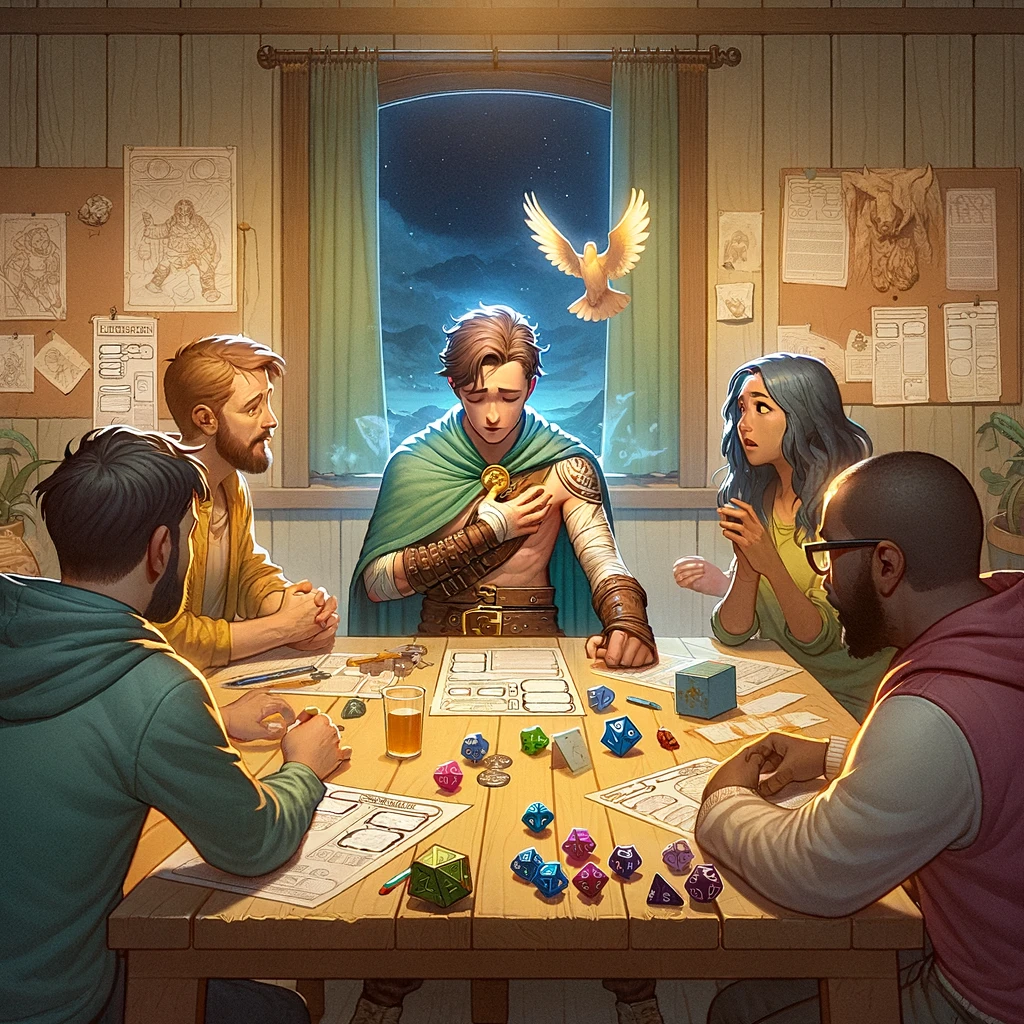
In D&D, stepping into the shoes of someone entirely different from yourself helps develop a deeper understanding of varied perspectives and challenges. This role-playing aspect encourages players to think and feel what others might, promoting empathy and compassion in real-world interactions.
Lesson #2: Teamwork and Diversity are Key to Success
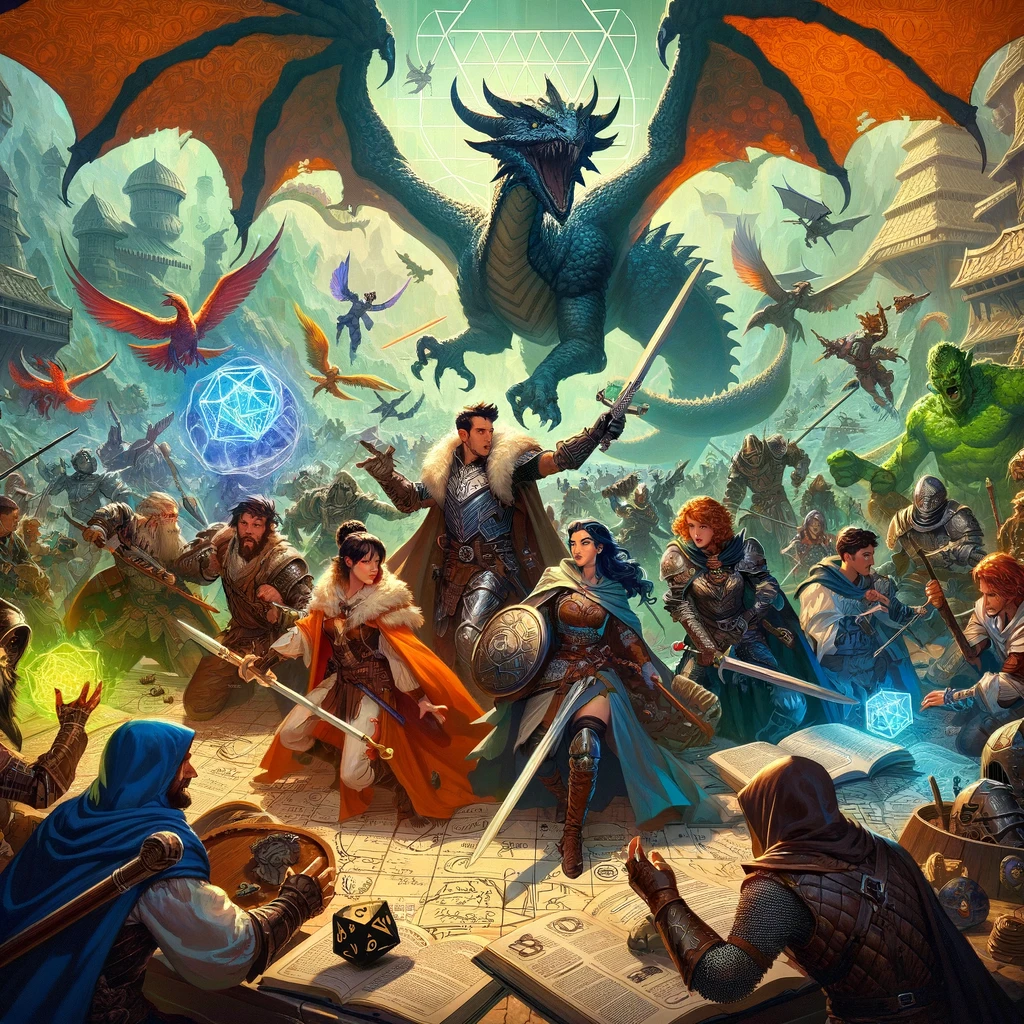
Success in D&D often hinges on the ability of a group to work together, utilizing the unique skills, backgrounds, and perspectives each player brings to the table. This diversity in teamwork not only enriches the gaming experience but also mirrors the importance of collaboration and inclusivity in achieving common goals in everyday life.
Lesson #3: Effective Communication and Active Listening
For a D&D campaign to run smoothly, players must communicate their ideas clearly and listen attentively to others. This practice of expressing thoughts effectively and giving full attention when others speak is crucial for resolving conflicts and building strong relationships, both in the game and in real life.
Lesson #4: Building Relationships
Through shared adventures and challenges, D&D players often form lasting bonds. These relationships, built on trust and mutual support, underscore the value of connecting with others on meaningful levels, highlighting the importance of camaraderie and friendship in our lives.
Lesson #5: The Power of Inclusivity
D&D champions the idea that everyone has a place at the table, regardless of background or experience level. This commitment to inclusivity not only enriches the game by bringing a variety of perspectives to the forefront but also teaches players the value of embracing diversity in all areas of life.
Lesson #6: Leadership Opportunities
In D&D, anyone can step up to lead, regardless of their character’s level or class. This teaches that leadership is not about position but about action and decision-making, encouraging players to take initiative and lead in their communities and workplaces.
Lesson #7: Learning to Lead and Follow
The dynamic nature of D&D allows players to experience both leading and following, providing valuable lessons in flexibility, understanding the strengths of others, and the importance of supporting leadership for the greater good of the team.
Lesson #8: Learning from Failure and Building Resilience
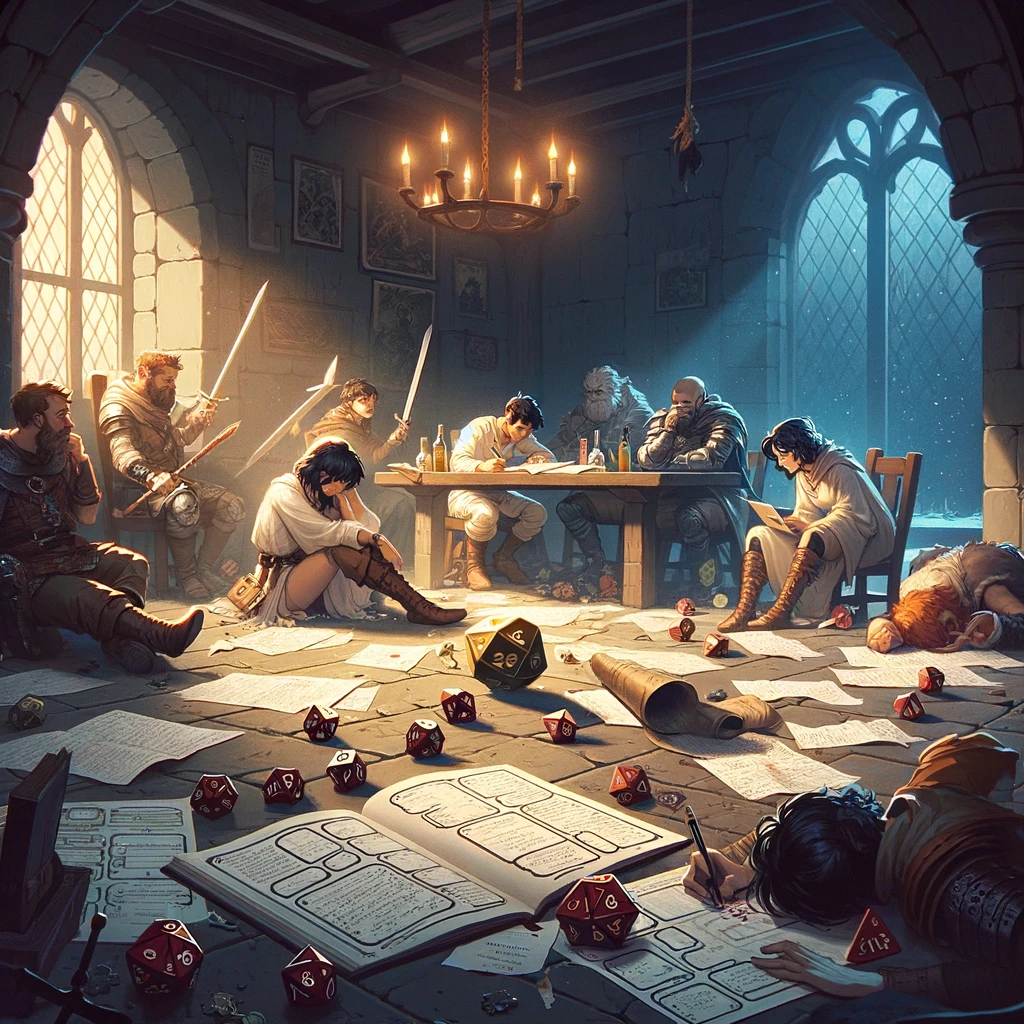
Failures in D&D, such as losing a character or a quest, are not endpoints but opportunities for growth. They teach players to rethink strategies and persist, fostering resilience that helps tackle challenges and setbacks in real life with a positive attitude.
Lesson #9: The Importance of Balance
D&D requires players to juggle various aspects of their characters’ lives, from adventure and combat to downtime activities. This balancing act mirrors the real-world need to manage different areas of our lives, emphasizing the importance of a well-rounded approach to personal and professional challenges.
Lesson #10: Patience and Dedication
Engaging in lengthy D&D campaigns requires patience and dedication, virtues that are equally valuable outside the game. This commitment to seeing things through, even when the end goal seems distant, is a powerful lesson in perseverance and dedication to one’s pursuits.
Lesson #11: Cultivating Patience
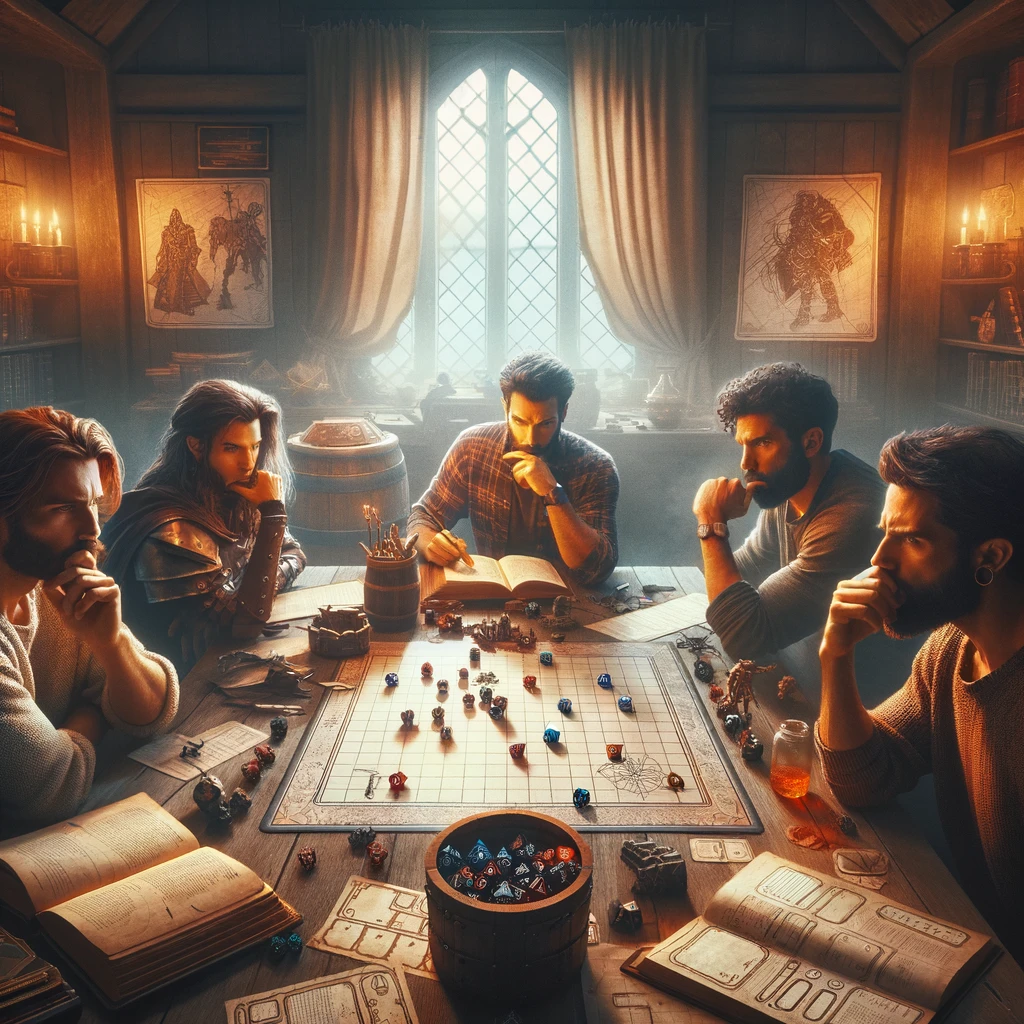
In D&D, not every obstacle can be overcome instantly. Waiting for the right moment to act or for a plan to unfold teaches players the value of patience. This skill is crucial in real life, where immediate results are not always possible, and persistence can lead to greater achievements.
Lesson #12: Resource Management
Effectively managing limited resources such as spells and equipment in D&D mirrors the real-world skill of resource management. Players learn to make strategic choices about when and how to use their assets, a lesson directly applicable to managing time, money, and energy in everyday life.
Lesson #13: Financial Planning
By managing in-game wealth, players gain insights into financial planning and investment. This aspect of D&D teaches the importance of saving for future needs, allocating resources wisely, and the impact of financial decisions, preparing players for similar financial responsibilities outside the game.
Lesson #14: Risk and Reward
D&D challenges players to weigh the potential risks against possible rewards, fostering the ability to make calculated decisions. This skill is invaluable in real life, where every choice comes with its own set of risks and benefits, and learning to balance these can lead to success.
Lesson #15: Respect for Rules and Flexibility
While D&D has a core set of rules, the game’s flexibility allows for creative problem-solving within those boundaries. This teaches players the importance of respecting structures while also being adaptable, a balance that is crucial in personal and professional environments.
Lesson #16: Continuous Learning and Exploration
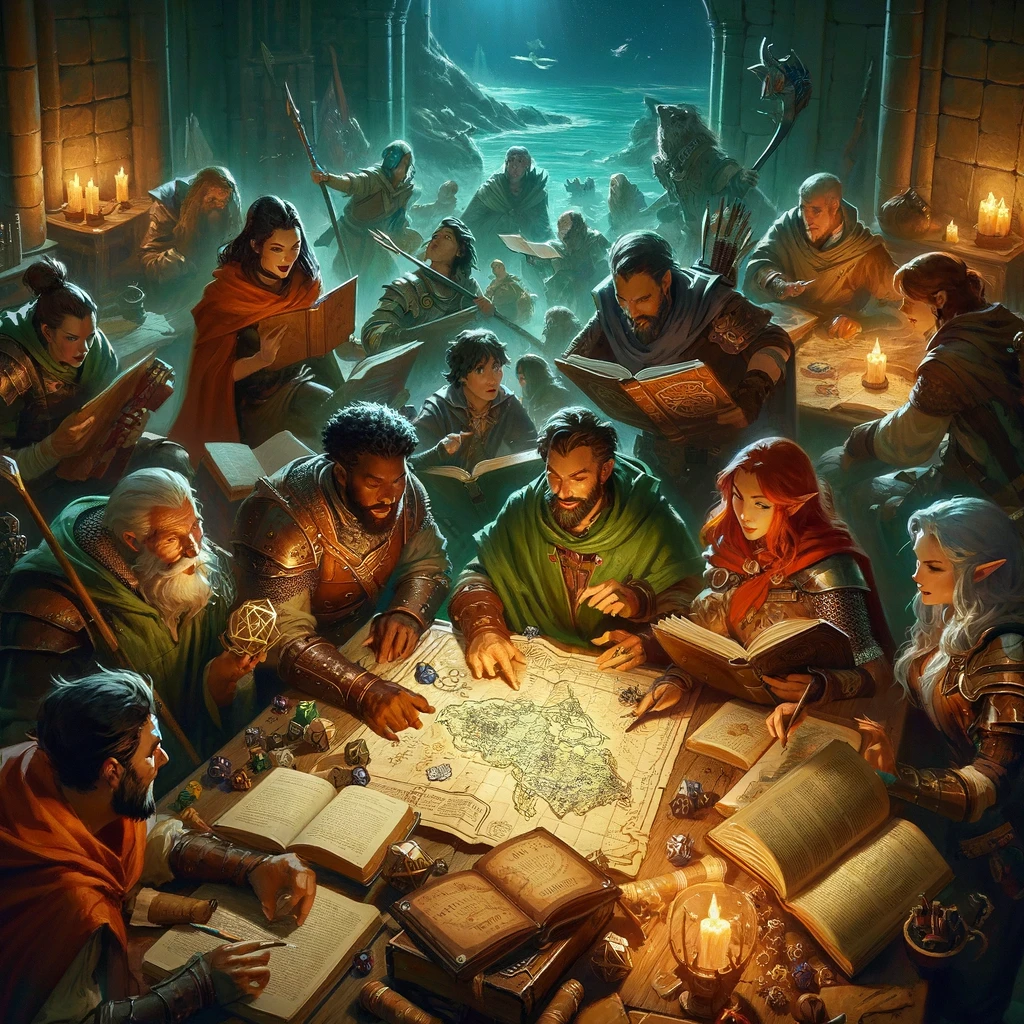
The ever-evolving world of D&D encourages players to continually learn and explore, whether it’s new game mechanics, worlds, or storylines. This mirrors the lifelong learning process in the real world, where curiosity and the pursuit of knowledge lead to personal growth and understanding.
Lesson #17: Problem-Solving Skills
Confronting challenges in D&D requires critical thinking and problem-solving, as players devise strategies to overcome obstacles. These situations improve players’ ability to analyze problems and find solutions, a skill that is highly beneficial in navigating life’s challenges.
Lesson #18: Creativity Unleashed
D&D’s open-ended gameplay fosters creativity, as players imagine new solutions to problems and unique approaches to challenges. This encouragement to think creatively leads to innovative outcomes in the game and inspires a similar approach to obstacles and opportunities in real life.
Lesson #19: The Power of Storytelling

Engaging in D&D’s storytelling deepens imagination and enhances communication skills, as players narrate their characters’ journeys. This ability to tell compelling stories is not only key to a memorable D&D experience but also enhances personal and professional communication by making messages more engaging.
Lesson #20: Enhancing Imagination
D&D’s fantastical settings and scenarios serve as a playground for the imagination, allowing players to envision and create worlds beyond the ordinary. This expansion of the creative mind is invaluable, as it fosters innovation and the ability to envision multiple possibilities in real-world situations.
Lesson #21: Strategic Thinking
Dungeons & Dragons encourages players to think several moves ahead, mirroring the strategic planning required in many real-life situations. Whether it’s deciding the best approach to tackle an enemy or planning a negotiation with a powerful NPC, players enhance their ability to forecast outcomes and prepare accordingly.
Lesson #22: Adapting to Change
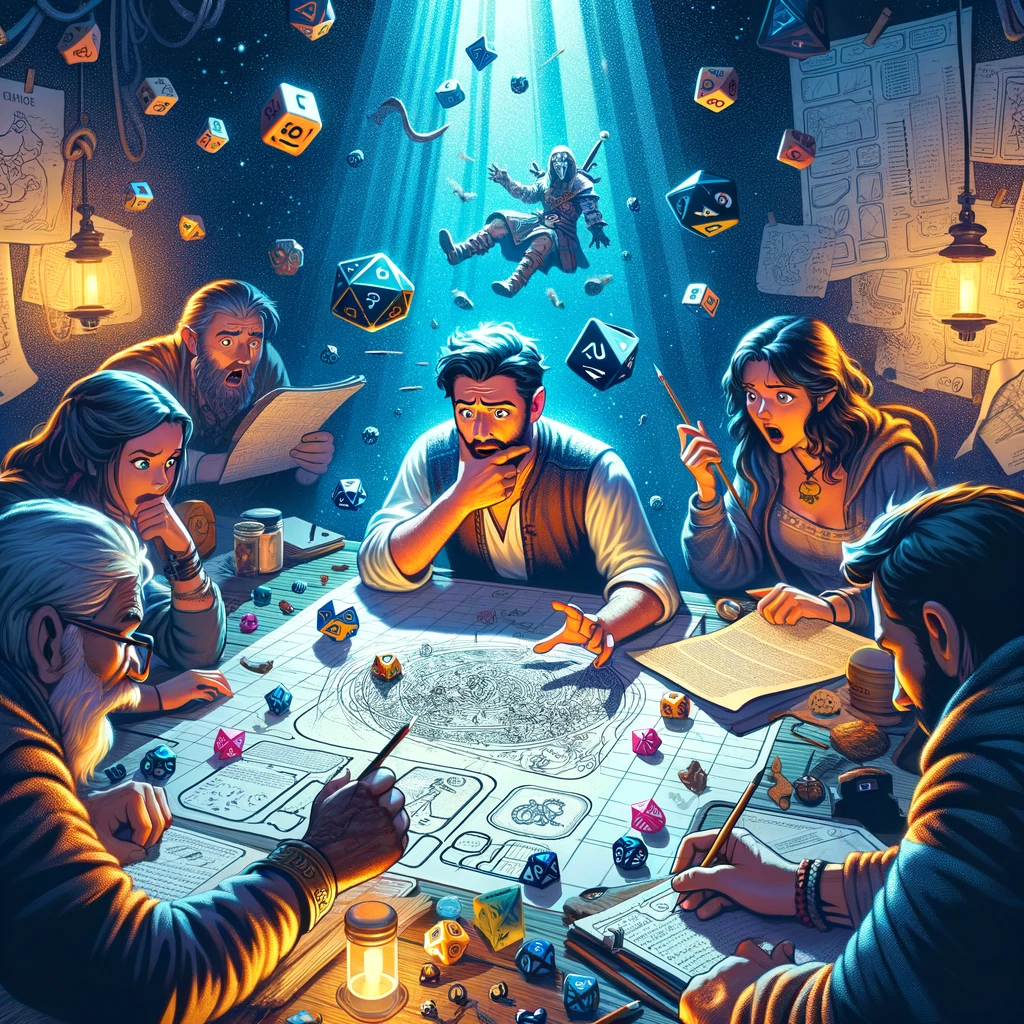
In both D&D and life, situations can change unexpectedly, demanding quick adaptation. Players learn to pivot their strategies and embrace flexibility, a skill that proves invaluable in navigating personal and professional changes or challenges.
Lesson #23: Initiative and Curiosity
By taking the lead in exploring new territories or delving into mysterious plots within the game, players cultivate a sense of initiative and curiosity. This proactive approach to seeking out new experiences and knowledge translates well into a valuable life skill, encouraging lifelong learning and exploration.
Lesson #24: Understanding Roles and Timing
D&D teaches players the importance of recognizing each person’s unique contributions and the critical timing of actions in collaborative efforts. This lesson is directly applicable to teamwork in any context, highlighting how understanding and valuing everyone’s role leads to greater collective success.
Lesson #25: Self-Expression and Personal Growth
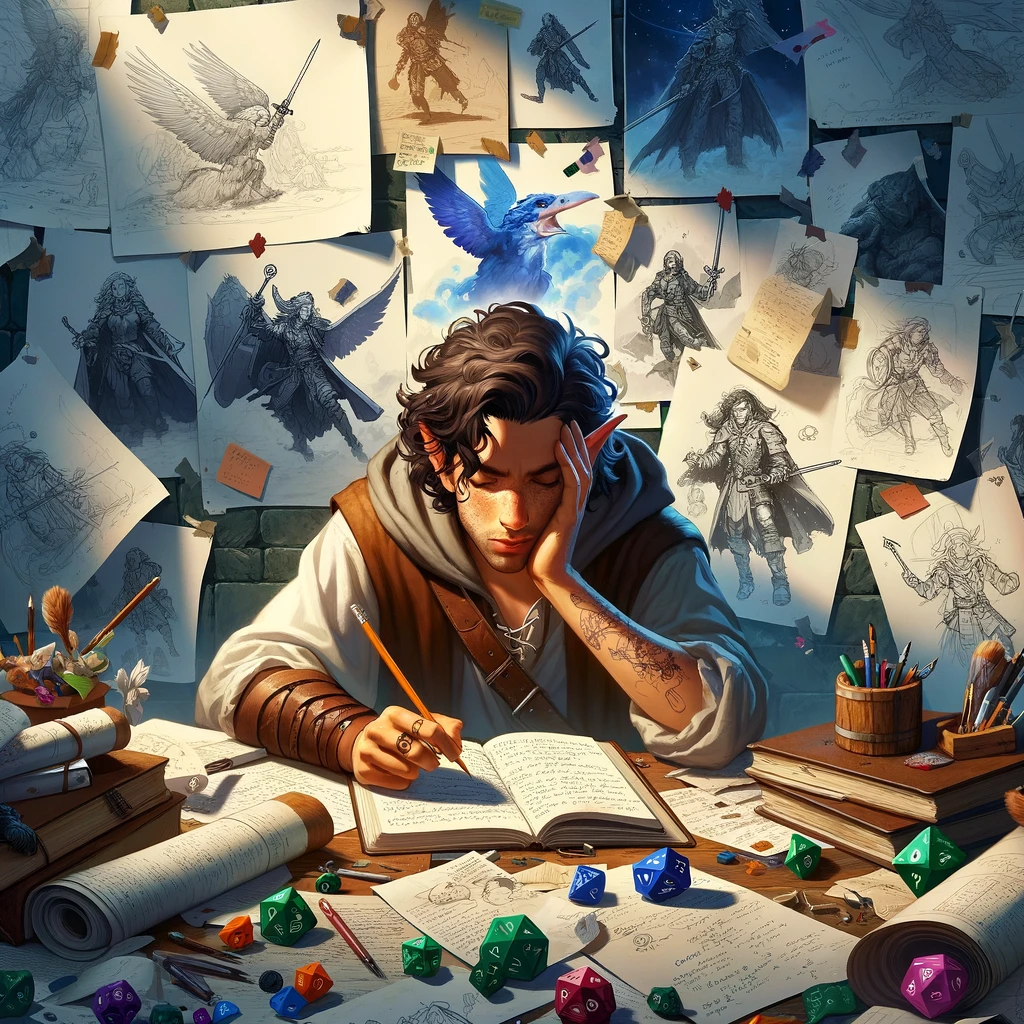
Creating characters and crafting their stories in D&D serves as a powerful medium for self-expression and personal exploration. Players have the opportunity to explore aspects of their identity in a safe and creative environment, facilitating personal growth and self-understanding.
Lesson #26: The Value of Uniqueness and Enjoying the Journey
The game celebrates the individual strengths of each character, teaching players to value their unique abilities and contributions. Emphasizing that the journey is as important as the destination, D&D encourages players to find joy in the experience and growth that comes from the adventure, not just the outcome.
Lesson #27: Importance of Choice
Every choice in D&D can lead to vastly different outcomes, demonstrating the real-life principle that our decisions have weight and consequences. This teaches players to consider their actions carefully and to understand the impact of their choices on themselves and others.
Lesson #28: Ethical Decision-Making
Players often face moral dilemmas in D&D that challenge their values and ethics, mirroring complex real-world decisions. Through these scenarios, players learn to navigate ethical considerations, reflecting on what they stand for and how to make choices that align with their morals.
Lesson #29: Conflict Resolution
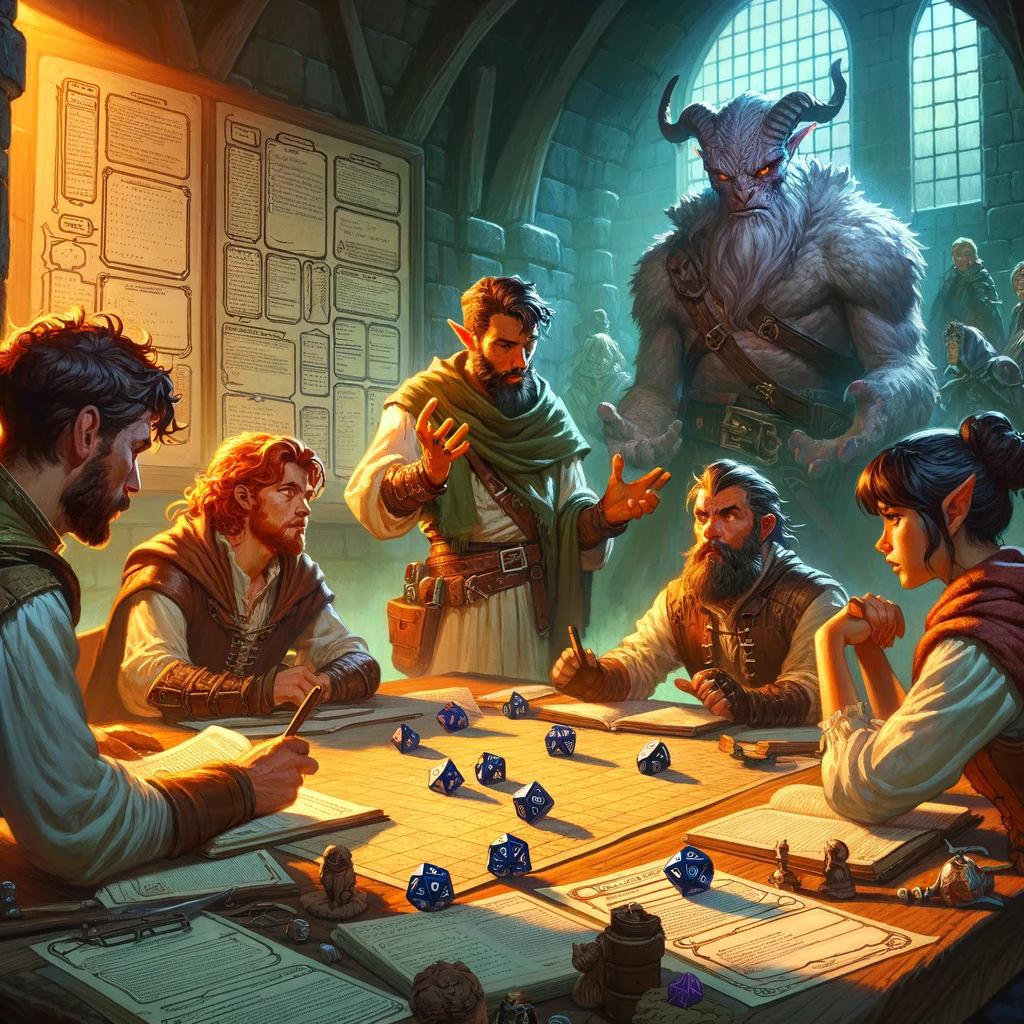
The game provides a framework for resolving conflicts in a structured yet creative manner, whether through diplomacy, negotiation, or combat. These experiences teach players effective conflict-resolution skills, emphasizing the importance of finding peaceful solutions where possible.
Lesson #30: Handling Pressure
High-stakes situations in D&D require players to make decisions under pressure, preparing them to manage stress and maintain composure in critical moments. This ability to stay calm and think clearly when faced with pressure is a valuable skill in any high-stress situation.
Lesson #31: Learning to Cooperate with Different Personalities
Dungeons & Dragons brings together players with varied personalities, each contributing to the team in unique ways. This diversity requires cooperation and understanding, teaching players the importance of valuing different perspectives and working harmoniously in a team, a skill that is crucial in both personal and professional life.
Lesson #32: Coping with Loss
In D&D, players often face setbacks, such as character deaths or failed quests. These moments teach players how to cope with loss and disappointment, reinforcing the idea that failure is a part of life and growth. Learning to move forward after a setback builds resilience, preparing players for inevitable challenges outside the game.
Lesson #33: Celebrating Successes
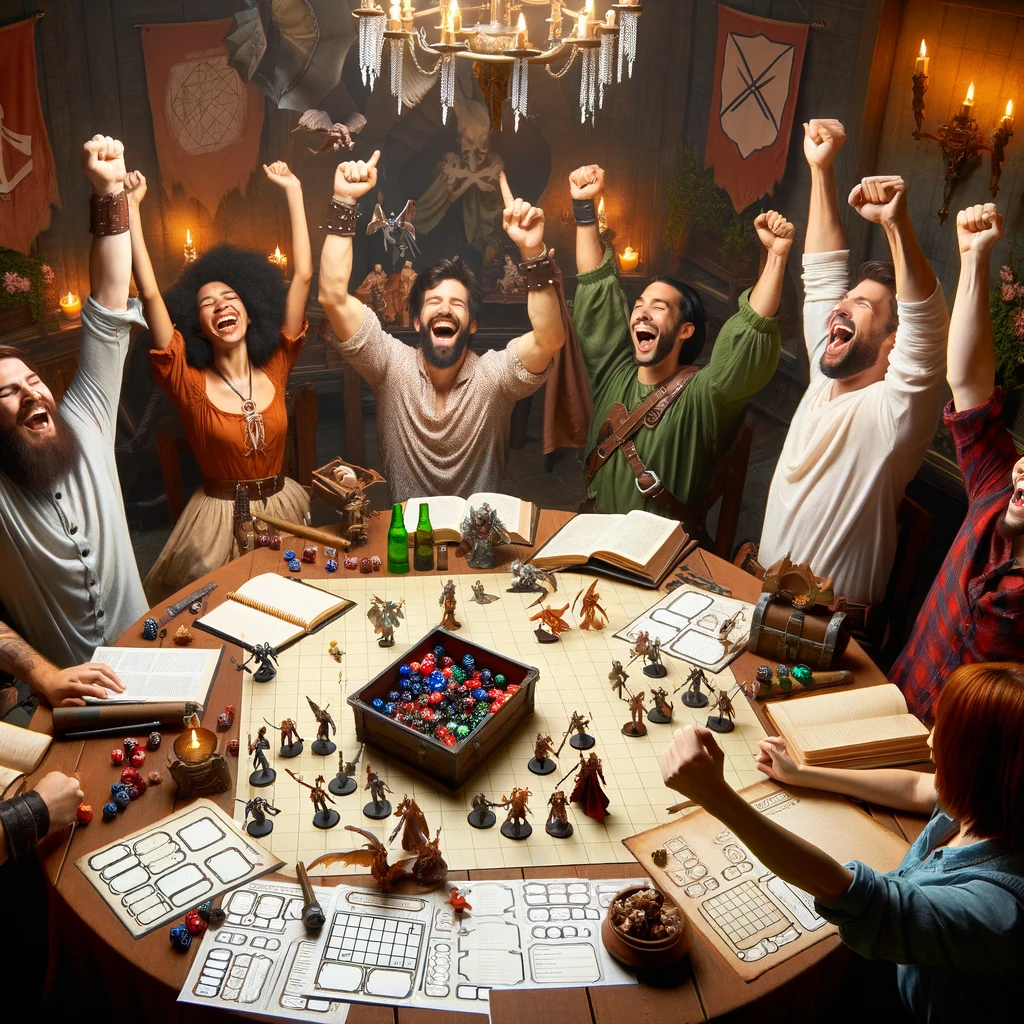
Victories in D&D, whether big or small, are celebrated by the group, fostering a sense of achievement and camaraderie. This shared joy not only enhances the gaming experience but also teaches the importance of recognizing and celebrating successes in life, encouraging a positive outlook and appreciation for one’s accomplishments.
Lesson #34: Navigating Complexities
D&D is filled with complex rules and multifaceted scenarios that challenge players to think critically and adaptively. Navigating these complexities improves problem-solving skills and the ability to manage intricate systems, paralleling the complexities encountered in real-world situations and decision-making.
Lesson #35: Critical Listening
Success in D&D often hinges on the players’ ability to listen to each other and to the Dungeon Master. Critical listening—paying attention to the details in narratives, clues, and the actions of others—enhances comprehension and teamwork, skills that are valuable in all areas of communication and relationship-building.
Lesson #36: Embracing Different Perspectives
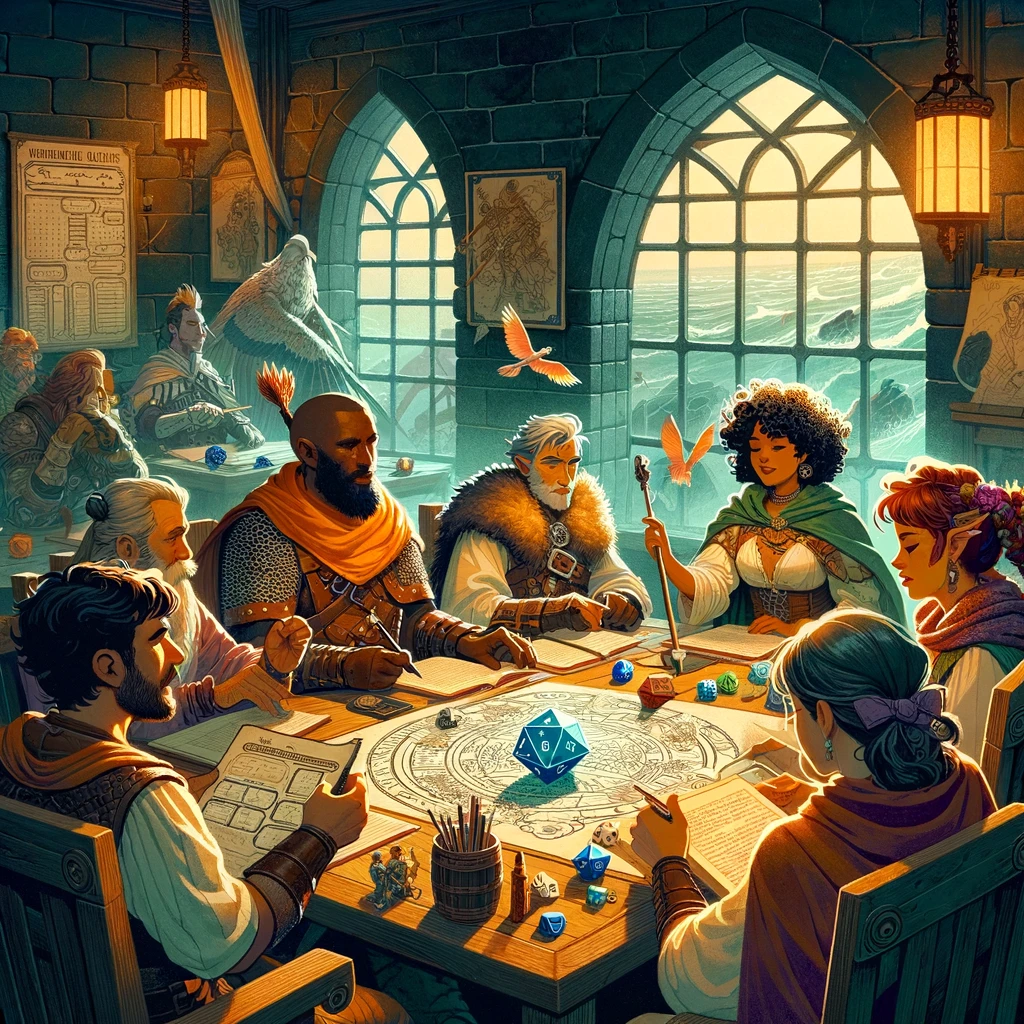
Role-playing different characters allows players to see the world through someone else’s eyes, fostering empathy and an understanding of diverse perspectives. This practice encourages openness to new ideas and ways of thinking, a valuable approach to interactions and problem-solving in a multicultural and diverse society.
Lesson #37: Building Confidence in Public Speaking
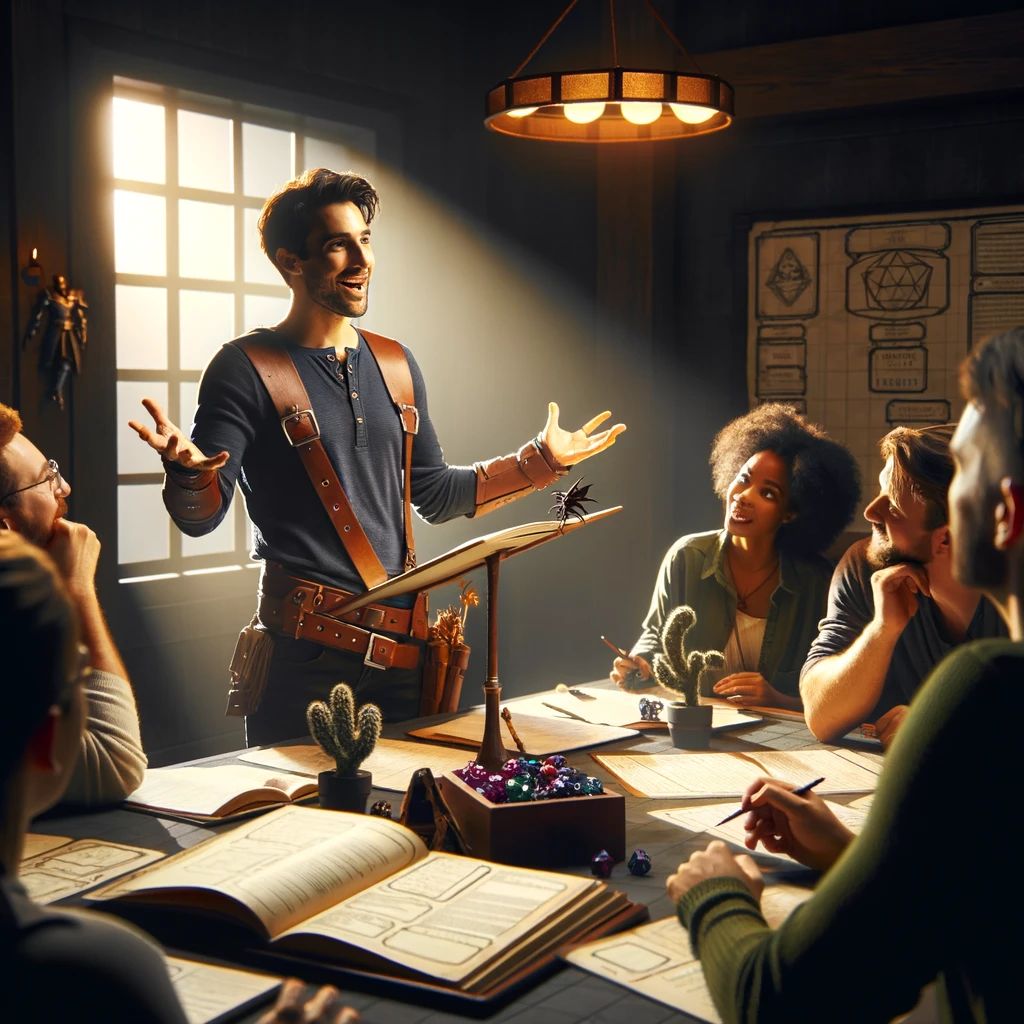
Character dialogues and narrative storytelling in D&D require players to speak up and share their ideas, often in creative and engaging ways. This practice builds confidence in public speaking and storytelling, enhancing communication skills that are essential for effective expression and leadership in various settings.
Lesson #38: Understanding the Value of Silence
In D&D, knowing when to speak and when to remain silent can be crucial for the strategy and development of the plot. This teaches players the value of restraint and timing, showing that sometimes silence can be a powerful tool in communication and decision-making.
Lesson #39: The Importance of Hobbies
D&D exemplifies how engaging in hobbies can provide relaxation, enjoyment, and a break from the stresses of daily life. It highlights the importance of having activities that foster creativity, social connections, and personal fulfillment, contributing to overall well-being and life satisfaction.
Lesson #40: Attention to Detail
Paying attention to small details in D&D can mean the difference between success and failure. This focus on detail trains players to observe and analyze their environments closely, a skill that enhances critical thinking and awareness in everyday tasks and professional endeavors.
Lesson #41: The Value of Mentorship
In D&D, experienced players guiding newcomers not only enriches the game for everyone but also exemplifies the broader value of mentorship. It highlights how sharing knowledge and experiences can facilitate learning, foster growth, and build confidence, echoing the importance of mentorship in personal development and career advancement.
Lesson #42: Acceptance of Different Narratives
The diverse storylines in D&D encourage players to open their minds to different viewpoints and narratives, promoting a culture of acceptance and understanding. This receptiveness to various perspectives enriches personal experiences and fosters a more inclusive approach to the world around us.
Lesson #43: The Importance of a Shared Experience
Engaging in shared adventures in D&D creates a strong sense of community and belonging among players. This shared experience strengthens bonds, builds lasting friendships, and demonstrates the value of collective experiences in forming deep connections with others.
Lesson #44: Understanding the Impact of Actions on Others
Through gameplay, D&D players learn that their decisions have consequences not just for their characters but for the entire group and the game world. This lesson underlines the significance of considering the broader effects of our actions on others and our communities, encouraging more thoughtful and responsible behavior.
Lesson #45: Valuing Non-Material Rewards
D&D highlights the value of non-material gains, such as the joy of shared experiences, personal growth, and the development of skills. These intangible rewards often surpass material gains in their lasting impact on our well-being and happiness, reminding us to cherish and seek out these meaningful achievements in life.
Lesson #46: Facing Fears
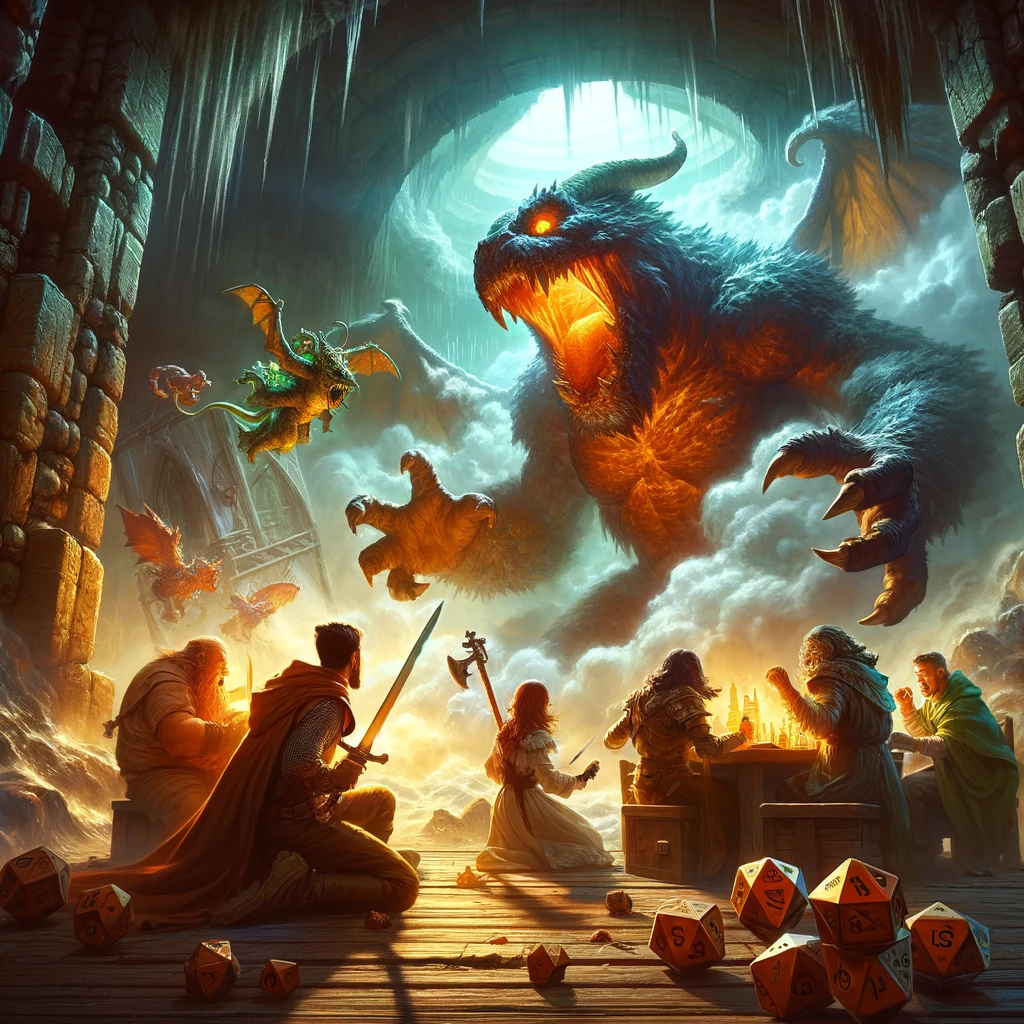
Confronting fears within the safe confines of the game allows players to practice courage and resilience, empowering them to face real-life fears with similar bravery. D&D acts as a rehearsal space for personal challenges, proving that overcoming fears can lead to growth and newfound confidence.
Lesson #47: Setting Boundaries
D&D teaches the importance of establishing clear boundaries, whether in the context of gameplay or interpersonal interactions. Learning to communicate and respect these boundaries is crucial for healthy relationships and personal well-being, reflecting the need for boundary setting in everyday life.
Lesson #48: The Importance of Preparation and Research
Success in D&D often comes down to how well players prepare and research, mirroring the value of these skills in achieving real-world goals. This lesson emphasizes the importance of diligence, foresight, and the acquisition of knowledge as foundations for success in any endeavor.
Lesson #49: Learning to Celebrate Others’ Successes
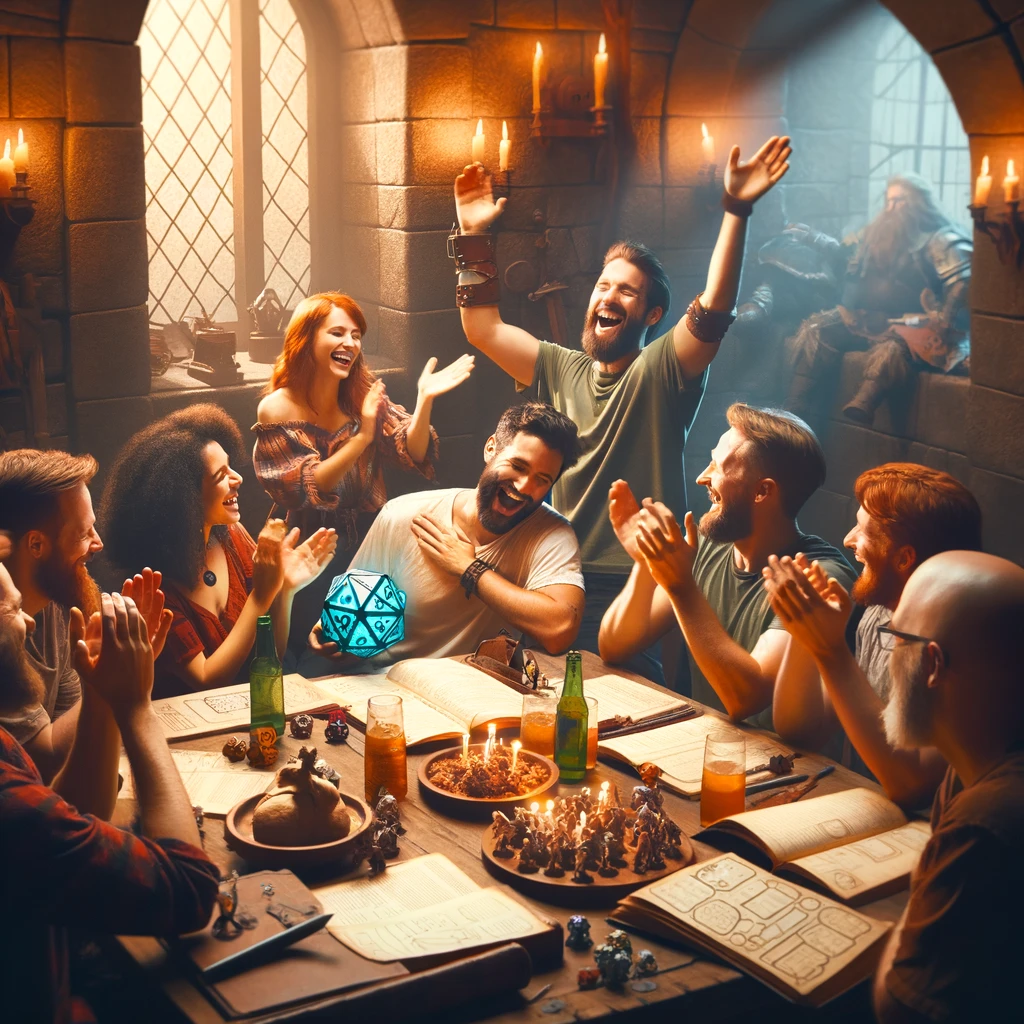
Recognizing and celebrating the achievements of fellow players in D&D fosters a supportive and positive environment. This practice nurtures a culture of appreciation and mutual respect, vital for building team spirit and enhancing personal relationships.
Lesson #50: Cultural Appreciation

The diverse settings and cultures represented in D&D encourage players to explore and appreciate the richness of different cultures and histories. This appreciation fosters a more open and inclusive worldview, highlighting the beauty and value of cultural diversity in our global community.
What Have You Learned from Playing D&D?
As we celebrate the remarkable milestone of 50 years of immersive gaming in Dungeons & Dragons, we’ve explored just a handful of the countless life lessons this beloved game has taught us. From empathy and teamwork to facing fears and appreciating cultural diversity, D&D is more than just a game; it’s a journey into the depths of our imagination, values, and personal growth. But the adventure doesn’t end here. We want to hear from you! What life lessons have you learned from your experiences with D&D? How has the game influenced your perspective on life, relationships, or personal challenges? Share your stories with us on our X/Twitter page @gnomishplays. Join the conversation and let’s celebrate the infinite worlds of wisdom found within the realms of Dungeons & Dragons together.
+++++++++++++++++++++++++++++++++++++++++++++++++++++++++++++++++++++++
+++++++++++++++++++++++++++++++++++++++++++++++++++++++++++++++++++++++
- Days ago = 3334 days ago
- New note - On 1807.06, I ceased daily transmission of my Hey Mom feature after three years of daily conversations. I plan to continue Hey Mom posts at least twice per week but will continue to post the days since ("Days Ago") count on my blog each day. The blog entry numbering in the title has changed to reflect total Sense of Doubt posts since I began the blog on 0705.04, which include Hey Mom posts, Daily Bowie posts, and Sense of Doubt posts. Hey Mom posts will still be numbered sequentially. New Hey Mom posts will use the same format as all the other Hey Mom posts; all other posts will feature this format seen here.













No comments:
Post a Comment